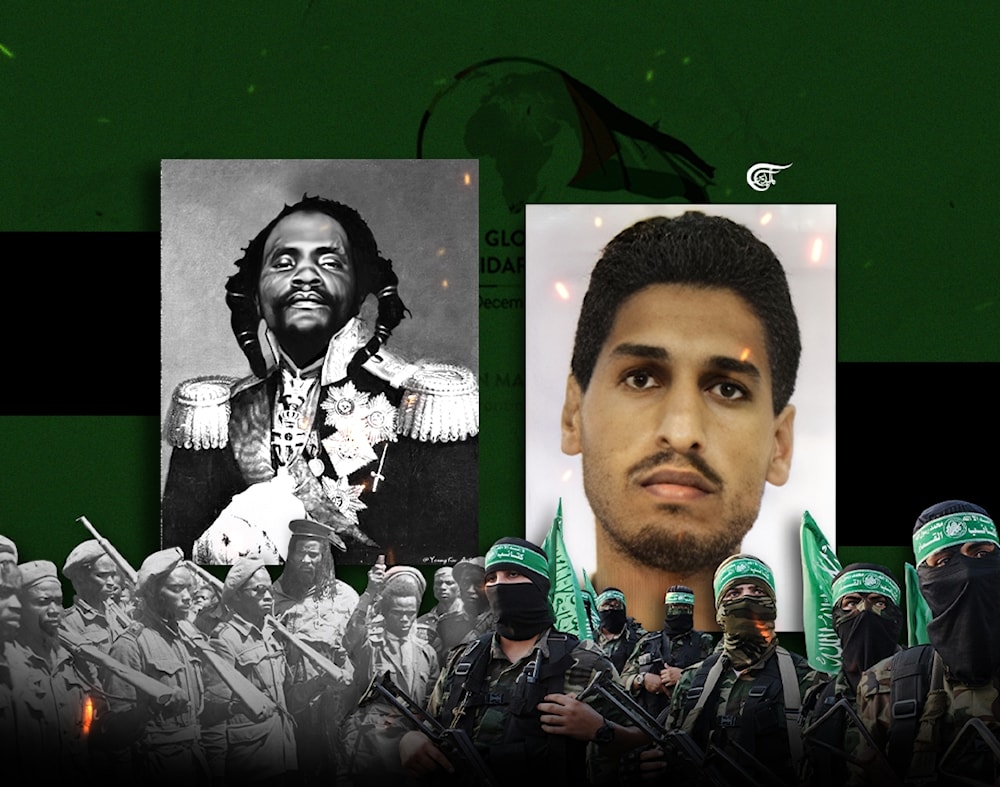From Kenya to Palestine: In support of armed resistance
History has taught us that resistance against settler colonialism in Kenya, South Africa and other previously occupied regions was a tumultuous journey, characterized by violence—a narrative that the occupiers sought to dismiss as "terrorism" or "barbarism."
-

The West often fails to acknowledge historical oppression, instead advocating for the normalization of "Israel's" control over Palestinians, while labeling any resistance as 'terrorism.' (Al Mayadeen English; Illustrated by Zeinab El-Hajj)
"Nelson Mandela and Palestine: Confronting Racism till Liberation" was the theme of the Fifth Global Convention of Solidarity with Palestine, organized by the Global Campaign to Return to Palestine, in collaboration with the Royal House of Mandela (RHoM). The convention coincided with the 10th anniversary of the death of Nelson Mandela, South Africa’s first president and a staunch supporter of liberation for the people of Palestine.
From the 3rd to 5th of December 2023, political leaders, intellectuals, activists, and representatives of various progressive organizations and social movements from across the globe came together in solidarity with Palestine against the genocidal Zionist project—"Israel".
During the three-day-long convention, we aimed to establish a common position on the crisis of Zionism, Resistance against "Israel’s" genocidal mission, and the need to build an anti-imperialist alliance across the world.
The platform provided a platform to debunk the fallacy of Western propaganda against armed resistance in occupied Palestine.
We drew parallels between the histories of resistance in Palestine, Kenya, South Africa, and other former settler colonies, from boardroom negotiations like the Oslo Accords and Lancaster House Conference, to armed struggles against oppressive colonizers by Hamas and the Kenya Land and Freedom Army also known as the MauMau.
Both resistance movements have been labeled as "terrorists" by settler colonizers. The West and other countries that acquiesce to "Israel" often tend to emphasize on Palestinian stories that fit a specific narrative—the "perfect victim" story.
This narrative focuses on portraying certain Palestinians as ethnocentrically "exceptional". Those who fit the idealized victim image: submissive, powerless, and preferably with a Western education. This selective portrayal intentionally overlooks different voices within the Palestinian community, creating a distorted dichotomy: Palestinians are either victims or terrorists… Never freedom fighters.
In apartheid-era South Africa and British-occupied Kenya, the colonized were expected to conform to certain standards of behavior, even in the face of aggressive colonization, to validate their humanity. Similarly, in occupied Palestine, Hamas' armed resistance — rooted in decades of Zionist oppression, led to Operation Al-Aqsa Flood on October 7, 2023, which has been met with severe Israeli military actions, resulting in the continuing massacre of Palestinian people we have witnessed every day.
The West often fails to acknowledge historical oppression, instead advocating for the normalization of "Israel's" control over Palestinians, while labeling any resistance as 'terrorism.'
Just as armed resistance movements in Kenya and South Africa were painted as threats to imperialist occupation, groups like the Kenya Land and Freedom Army (KLFA) and the armed wing of the Africa National Congress (ANC) — uMkhonto we Sizwe, faced imprisonment by colonial powers. Their communities endured hardships almost similar to the plight seen in Gaza's concentration camps.
History has taught us that resistance against settler colonialism in Kenya, South Africa and other previously occupied regions was a tumultuous journey, characterized by violence—a narrative that the occupiers sought to dismiss as "terrorism" or "barbarism."
Nabil Halak, international coordinator of The Arab International Center for Communication and Solidarity, reflected on similarities of the armed struggle in Palestine and Kenya: "Throughout history, there have always been movements combating atrocities, occupation, and aggression. Palestinians have endured occupation since 1917. From British colonization and later Zionist occupation. Interestingly, there are parallels between the Palestinian struggle and the Kenyan uprising from 1952 to 1960, both resisting atrocities and colonization using similar strategies. The initial challenges faced by the liberation movements in Palestine and Kenya were akin, contending with British hypocrisy and occupation. Today, the Palestinian resistance movement, particularly spearheaded by Hamas in Gaza, persists in defending dignity, preserving identity, and fiercely fighting for Palestine's liberation.".
In an attempt to vilify justified armed resistance in Palestine, "Israel" and supporters of the Zionist project conflate the Palestinian armed struggle with ISIS. "Israel" uses unfounded claims to justify their violent actions in Gaza. Despite efforts to discredit Palestinian Resistance, the right to armed resistance against a long-standing settler-colonial state remains valid in Gaza as with the rest of the world resisting imperialism, colonialism and neocolonialism.

 Maureen Kasuku
Maureen Kasuku
 4 Min Read
4 Min Read







